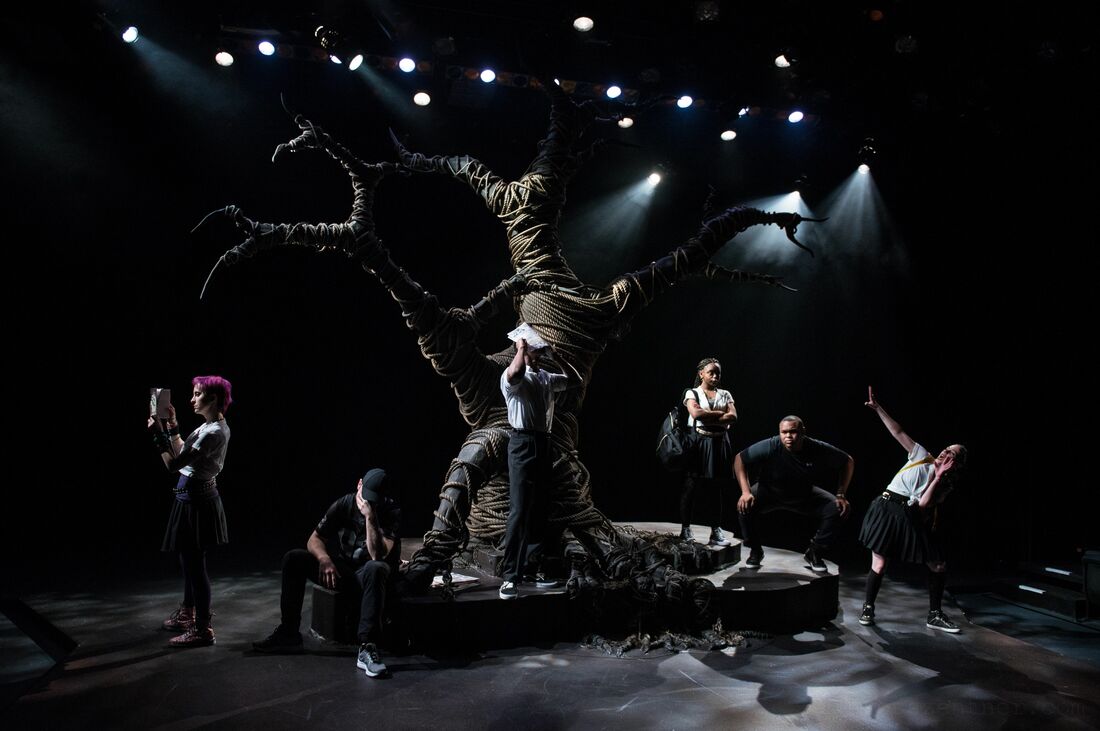|
Clearing-up racial tensions in the U.S. should be easy. We should be able to look around and identify that we’re all essentially the same in a tiny, dangerous world in the big, scary vacuum of the universe. We should acknowledge our past and get on with the complex nature of survival in a precarious socio-economic world with an environment on the brink of collapse. We should realize that there’s a hell of a lot of work to do. We should realize that we need to grow-up if we’re going to survive. We live in an intellectual world that’s a lot more complicated than that, though. Playwright Dominique Morisseau’s Blood at the Root explores the complexity of racial relations in the U.S. with a cleverly-constructed script that reaches into a big, messy issue with a tender scalpel. Marti Gobel directs a sharp production of the drama for Next Act Theatre this month. Chantae Miller makes a vulnerably heroic appearance as Raylynn--the first African-American student to run for class president at a small school in Louisiana. She challenges unwritten norms by hanging out beneath an old tree near the school that has been the exclusive domain of white students. Tensions flare when the action evidently provokes a few foreboding nooses to appear on the tree in an act the school principal dismisses as a prank. Gobel applies a deft hand to a very intricate script. It’s far too easy to think in simplistic terms of Good vs. Evil when dealing with racial tensions in the U.S. It’s far too easy to stage a drama in and around a high school that features the time-worn two-dimensional archetypes that litter so mean teen exploitation comedies and dramas in TV and pop cinema. The archetypes can make for decent drama, but they don’t do justice to the true complexities of modern society. Morisseau recognizes the sophisticated complexities of high school students, allowing the drama to reach a striking emotional depth not often seen in pop drama on any flat, glowing screen. Miller is joined by a thoughtful, talented ensemble. Justin Lee has a charmingly relatable gravity about him in the role of De’Andre, who plays in the school’s football team. Ibraheem Farmer cleverly encumbers himself with a lightly brooding pragmatism as Justin--editor of the school newspaper. Justin runs into some occupational friction with student journalist Toria, played with passion tempered with a smartly muted intellectual frustration by Grace DeWolff. Cultural complexities are vividly brought into the ensemble by April Paul, who plays Asha: a white student who only feels at home in African-American culture. Paul has shown great versatility in a number of productions. Here she disappears into a captivating role around the edges of a very interesting ensemble. Casey Hoekstra compellingly rounds out the cast as a high school quarterback who has transferred-in from another school. His admiration for Raylynn adds another level of depth to an already complicated script. Hoekstra’s naturalistically composed presence keeps the added layer of complexity from feeling too extraneous to be explored in an already dense script. The action of the scenes is fused together by dance that’s been engagingly choreographed by Alicia Rice to powerful music composed by Kemet Gobel. It’s doubtlessly difficult to find the right movements for six people to fill a small stage dominated by a rather large tree, but Rice makes it work. Scenic/lighting designer Jason Fassl’s huge, imposing rope-covered tree is beautifully ominous, but it poses interesting challenges to movement in and around the stage in the very concrete and earthbound reality of an American high school. As the show’s movement director Marti Gobel has found a way to make the small space onstage feel big enough to hold the tense drama of a very satisfying script. Next Act’s production of Blood at the Root runs through Feb. 24 at Next Act’s space on 255 S. Water St. For ticket reservations and more, visit Next Act Online or call 414-278-0765.
0 Comments
Leave a Reply. |
Russ BickerstaffArchives
July 2024
Categories |

 RSS Feed
RSS Feed
